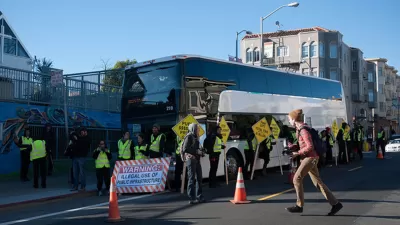Having lost their CEQA appeal with the San Francisco Board of Supervisors, the "tech bus" opponents are taking their case to the court, arguing that environmental impacts from the large, luxury private buses using public bus stops must be addressed.
The Board of Supervisors had voted 8-2 on April 1 to reject the appeal of the San Francisco Municipal Transportation Agency (SFMTA) approval of the 18-month pilot bus program filed by the coalition of tenant and labor activists who view the buses as both a symbol and cause of city gentrification that results in escalating housing costs. Without the buses, workers in Silicon Valley might live closer to work or elsewhere, they reason.
"The City contends that the pilot is exempt from environmental review [a requirement of the California Environmental Quality Act (CEQA)] because its intent is data collection," writes The Examiner's Joshua Sabatini.
The lawsuit, which was filed Thursday (May 1) in San Francisco Superior Court, asks a judge to prevent the commuter shuttle program from going forward as conceived. It argues California Vehicle Code only allows public buses to pull into red zones or Muni bus stops. The lawsuit also alleges that an environmental review must take place to address impacts ranging from displacement of tenants to pollution.
Sabatini adds that "(p)laintiffs' attorney Richard Drury said they will also consider filing a preliminary injunction to ask a judge to prevent the pilot from launching until the lawsuit is settled." It is unclear if the injunction would shut down the existing operation of tech buses, or if the pilot program, set to begin July 1, would have to wait until it underwent the rigorous CEQA process.
"Under the terms of (the pilot program), employers and shuttle operators will pay to use 200 of Muni’s 2,500 bus stops, addressing concerns that the shuttles are using taxpayer-funded transportation facilities and right-of-ways without compensating the public for the extra strain on the system," as we noted here in January.
The benefits of the shuttle bus program, according to the city's January press release, include "eliminating at least 45 million vehicle miles traveled and 761,000 metric tons of carbon every year from the region’s roads and air.”
FULL STORY: SF group seeks to halt tech bus pilot program

Planetizen Federal Action Tracker
A weekly monitor of how Trump’s orders and actions are impacting planners and planning in America.

Restaurant Patios Were a Pandemic Win — Why Were They so Hard to Keep?
Social distancing requirements and changes in travel patterns prompted cities to pilot new uses for street and sidewalk space. Then it got complicated.

Maui's Vacation Rental Debate Turns Ugly
Verbal attacks, misinformation campaigns and fistfights plague a high-stakes debate to convert thousands of vacation rentals into long-term housing.

In California Battle of Housing vs. Environment, Housing Just Won
A new state law significantly limits the power of CEQA, an environmental review law that served as a powerful tool for blocking new development.

Boulder Eliminates Parking Minimums Citywide
Officials estimate the cost of building a single underground parking space at up to $100,000.

Orange County, Florida Adopts Largest US “Sprawl Repair” Code
The ‘Orange Code’ seeks to rectify decades of sprawl-inducing, car-oriented development.
Urban Design for Planners 1: Software Tools
This six-course series explores essential urban design concepts using open source software and equips planners with the tools they need to participate fully in the urban design process.
Planning for Universal Design
Learn the tools for implementing Universal Design in planning regulations.
Heyer Gruel & Associates PA
JM Goldson LLC
Custer County Colorado
City of Camden Redevelopment Agency
City of Astoria
Transportation Research & Education Center (TREC) at Portland State University
Jefferson Parish Government
Camden Redevelopment Agency
City of Claremont



























